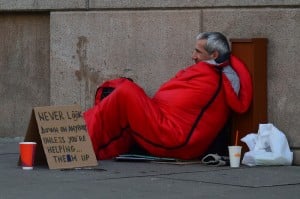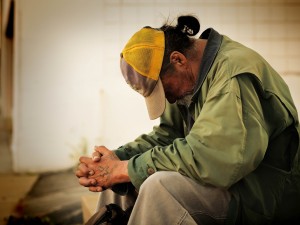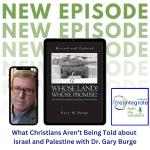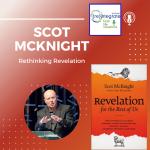Part 2: Understanding Poverty
About 1.4 billion of the world’s population live in extreme poverty, meaning they lack the basic necessities of life. A further 1.1 billion live at subsistence level, on a kind of “hand-to-mouth” existence that is only one crisis away from disaster.[1] Economic poverty affects nearly 40 percent of humanity. Given what we have seen in Genesis 1 and 2, this is clearly not how God intended things to be. So why is this the daily reality of so many people?
In a world that was entirely level and fair, good choices would lead to provision and wealth, and poor choices to poverty. In such a cause-and-effect world, the truth of proverbs such as, “In all toil there is profit, but mere talk leads only to poverty,” (Proverbs 14:23) would make perfect sense. Laziness, wasteful indulgence, poor self-discipline and addictive behaviour would all lead naturally to poverty. On the other hand, hard work, careful consumption, healthy self-discipline and freedom from addictions would result in wealth. This may be the case for millions or billions of people in the world today—their relative wealth or poverty being due largely to their own good choices, hard work, and ingenuity. In well-governed societies, among those with equal access to resources and education, and in situations where illness, disaster, family dysfunction, crime, and accidents do not hamper people, individuals’ wealth and poverty may be the fair outcomes of personal effort.
But the truth is that on a global scale, we don’t live in anything close to a level playing field. The fallen world is neither fair nor even-handed. None of us start life from the same position. Our family, community and societal circumstances dictate much about our opportunities in the world. Some of us are fortunate to be born into loving, nurturing families in prosperous countries, with a myriad of abilities and opportunities. Sadly, others are born into circumstances that are resourceless in every sense of the word. They are never given the basis they need to provide for themselves.

It is true that the majority of poverty is a result of some form of human sin and error. But it is not necessarily their own sin that causes people to lack provision or wealth. Poor government, war, corruption, exploitation by the powerful, lack of education and training, family and social ills that prevent people from reaching their potential, all contribute to many people not having enough, through no fault of their own. In particular, lack of provision often lies in whole or part with social or personal sin against the poor. That is, they are victims of others’ sin. A tyrant confiscates a family’s land, depriving them of their capacity to produce. A factory exploits vulnerable workers by paying below legal wages and threatening those who object. A wealthy landowner strips large tracts of forested land of its vegetation, putting millions of people downstream at risk of flooding. A husband becomes addicted to gambling, and leaves his wife and children penniless. An investment fails because of fraud and deception, leaving a family who had saved hard for the future without means.
Even so, not all poverty is the result of sin, or at least not sin that can be traced to anyone in particular. Some people are unable to provide for their needs because of disability, illness, age or other factors that aren’t anyone’s fault. In the Old Testament, three such groups of people were particularly vulnerable—“the widow, the orphan and the foreigner.” [2] Anticipating this, the Hebrew Law contained regulations that would ensure these people were provided for. [3] Zechariah is typical of the Prophets when he writes: “Thus says the Lord of hosts: Render true judgments, show kindness and mercy to one another; do not oppress the widow, the orphan, the alien, or the poor” (Zechariah 7:9-10).[4]
Other poverty occurs because of the unpredictability of our planet. A natural disaster such as an earthquake, tsunami, drought or flood can devastate whole communities, destroying crops, homes, possessions and livelihoods in a single moment. For example, a quarter of a million people lost their lives in the Boxing Day tsunami in 2004 that swamped coastal Indonesia and other parts of South East Asia, and many more survivors were left homeless and without any means to provide for themselves.
We must be very careful then, not to make assumptions about the reasons for anyone’s situation—rich or poor. So many factors are at work, some of individuals’ own making; many outside their control. The Bible is very realistic in this regard. For example, it has been noted that, “fewer than one-third of the proverbs dealing with rich and poor teach that people get what they deserve, whereas the rest recognize the presence and problem of socio-economic justice.”[5] So while there are times when the Bible connects provision or lack of it with a cause, generally Scripture is less concerned with identifying the particular causes of poverty and more concerned with the obligations of those who have wealth to care for those who lack provision.
Click to Like Theology of Work Project on Facebook

[1] World Bank, World Development Indicators 2011 (Washington, DC: World Bank Publications, 2011), 65. In the World Bank’s definition, “extreme” poverty means living on less than US$1.25 a day (at purchasing power parity) and “subsistence poverty” means living on less than US$2.00 per day.
[2] The care of these three groups was repeatedly viewed as a yardstick of whether Jewish society was fulfilling its covenantal responsibilities. See, for example, Exodus 22:22; Deuteronomy 10:18; 24:17-22; Psalm 146:9; Isaiah 1:17; Zechariah 7:9-10.
[3] Gleaning was one practice prescribed for this very situation. See, for example, the situation of Ruth and Naomi in Ruth 2:2-3.
[4] See also Jeremiah 7:5-7.
[5] Craig Blomberg, Neither Poverty Nor Riches(Eerdmans, 1999), 65, noting an observation of Norman Gottwald.












